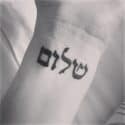
Parashat Emor: Of Mohawks and Tattoos
“The Eternal said to Moses: Speak to the priests, the sons of Aaron, and say to them: None shall defile himself for any [dead] person among his kin, except for the relatives that are closest to him: his mother, his father, his son, his daughter, and his brother; also for a virgin sister, close to him because she has not married, for her he may defile himself. But he shall not defile himself as a kinsman by marriage, and so profane himself. They shall not shave smooth any part of their heads, or cut the side-growth of their beards, or make gashes in their flesh.” (Leviticus 21:1-5)
Parashat Emor (“Speak;” Leviticus 21:1-24:3) emphasizes the communication of a number of critical rules for the priests. God says these laws to Moses, who in turn communicates them to the sons of Aaron. Our first five verses reveal prohibitions laid out specifically for the priests, especially with regards to contact with the dead. The Haftarah portion (Ezekiel 44:15-31) reiterates many of these teachings about the priests, even though it was written in Babylonian exile.
While a number of the texts about priests feel foreign or irrelevant to us in the 21st century, this week’s portion contains laws that are still actively followed.
As many of you know, those who are descended from the Kohanim (priests) are often still, even to this day, prohibited from attending gravesite burials.
As one Jewish funeral website explains:
In general, a Cohen / כהן, a descendant of Aaron the High Priest, may not come in contact with any dead body. Additionally, a Cohen may not enter a building where a dead body of a Jew lays. Outdoors, a Cohen is forbidden to come within Arba Amot / ארבע אמות — four cubits of a Jewish corpse or a Jewish grave. A Cohen is commanded (Leviticus 21:1-2) to be in a state of purity and avoid ritual defilement by a corpse, which is ritually unclean. Therefore, Cohanim / כהנים – the priests, usually do not participate in the burial unless it is one of the closest relatives mentioned below.
Then, Verse 5 gives us an interesting bit of information: They shall not shave smooth any part of their heads, or cut the side growth of their beards, or make gashes in their flesh.
From this one verse, we learn that we should not shave their heads bald, men should let their peyot grow long, and gashes or incisions in the flesh are prohibited. (Well, many of us shave our heads [including me], none of the Jewish men I know wear peyot, and plenty of Jews have tattoos). This verse is repeating prohibitions that are first mentioned a few chapters earlier in Leviticus. Though it is repeated, and thus seems all the more important to our ancestors (and/or God), few of us observe these laws.
Let’s talk on Shabbat about two of these prohibitions: Kohanim and cemeteries, and Jews and tattoos. I look forward to wrestling with the Torah with you all in a few days!
Shabbat Shalom!





